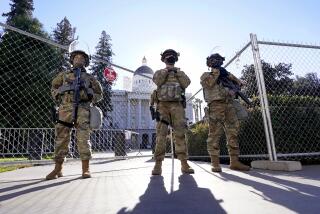Deploying was ‘worst nightmare’
WASHINGTON — He was trained by the military as a psychiatrist to help returning soldiers deal with the mental stress of combat, but by some reports, the horror stories he heard gradually began to change him too.
Army Maj. Nidal Malik Hasan turned against the wars in Iraq and Afghanistan and was becoming a more devout Muslim.
When he recently got orders to deploy to Iraq on Nov. 28, he became distraught.
“He never told us” he was going to deploy, his cousin Nader Hasan told Fox News. “We’ve known for the last five years that was probably his worst nightmare. He would tell us how he would hear things, horrific things.”
Investigators are now poring over the pieces of Hasan’s life after the shootings Thursday at Ft. Hood, Texas, looking for what might have led to his alleged attacks on the base, to which he had been transferred in July.
Nader Hasan told news outlets that his cousin had complained of being harassed for being a Muslim and had tried to leave the military.
A senior U.S. counter- terrorism official said Thursday night that the Army and FBI were looking into whether Hasan, 39, had come to the attention of federal law enforcement officials as the suspected author of inflammatory Internet comments likening suicide bombers to heroic soldiers who give their lives to save others.
The official refused to say whether Hasan’s alleged comments and actions were significant enough to prompt an investigation or monitoring by the FBI or other law enforcement agencies.
Such comments would paint a picture of a man that contrasts sharply with the recollections of his neighbors, who portrayed him as quiet and polite.
While completing his medical internship and residency at Walter Reed Army Medical Center in Washington, Hasan lived in a 22-story brick apartment building in Silver Spring, Md., that had a sprinkling of military service members but catered mostly to people of modest incomes.
Viviane Tchanghan was Hasan’s next-door neighbor.
“He was a nice man, quiet,” said Tchanghan, 30, a waitress. “We used to say, ‘hi’ and ‘hi,’ that’s it. I was shocked this morning.”
She said Hasan mostly kept to himself. He had taped a piece of paper on his door with writing in a foreign script that she took to be Arabic. She said that someone told her the inscription said “Allah,” or “God.”
The Rev. Malcolm Frazier, 59, a United Methodist minister at Howard University and a 10-year resident of the building, described Hasan as short and stocky with an olive complexion. He said he would exchange pleasantries with Hasan from time to time.
Frazier said he saw Hasan either in uniform or in what he took to be Muslim attire, a long garment with pants underneath and a skullcap.
Other neighbors said they saw him come and go in his military uniform, carrying a small black duffel bag.
FBI agents interviewing the neighbors Thursday asked people not to discuss Hasan.
Hasan was born in Virginia and grew up with two brothers in Roanoke. He attended college at Virginia Tech in Blacksburg, Va., where he majored in biochemistry.
Hasan joined the military in 1997 at the age of 27. The Army sent him to the Uniformed Services University of the Health Sciences to study medicine.
He graduated from the university in 2001 and served as an intern, resident and psychiatry fellow at Walter Reed from 2003 until this year.
At Walter Reed, Hasan was reportedly disciplined for proselytizing.
He was raised a Muslim, although he listed no religious preference on some personnel records.
The deaths of Hasan’s parents, in 1998 and 2001, led him to become more religious, according to his cousin. His parents had emigrated from a village near Jerusalem, the New York Times reported, and owned restaurants and a store in Roanoke.
The Washington Post reported that Hasan prayed at the Muslim Community Center in Silver Spring at least once a day.
Faizul Khan, a former imam at the center, told the Post that Hasan was “very devout” and often attended prayers in his Army fatigues.
Hasan also looked for a wife through the center’s matrimonial seminar, describing himself as “quiet and reserved” but also “funny, caring and personable.” Khan told the Post that Hasan never found a match because “he had too many conditions.”
Hasan, shot multiple times by officials responding to Thursday’s attack, remained in stable condition in custody at a hospital.
--
azajac@latimes.com
Times staff writers Kate Linthicum in Los Angeles and Christi Parsons, Kimberly Geiger and Josh Meyer in Washington contributed to this report.
More to Read
Sign up for Essential California
The most important California stories and recommendations in your inbox every morning.
You may occasionally receive promotional content from the Los Angeles Times.









